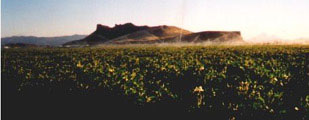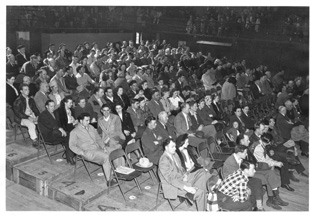Honor the Klamath Water
Users
Klamath Water Users Association invites you to
attend their annual meeting celebrating 100 years of
the Klamath Project
By Klamath Courier Reporter 10/4/05Please honor
the Klamath Water Users with your presence at their
annual meeting October 11th at Reames
Golf and Country Club.
|
When you awoke this morning to the sound of
wheel line sprinklers and frogs and ducks in the
ditches, if you are a Klamath Basin resident,
you’ll thank God that water is still coming to
the farms and wildlife. That’s because you lived
through 2001, when the federal government shut
off water to 1400 family farms. You remember the
dry parched fields, dust storms, exodus of farm
laborers, dead wildlife, auctions and
depression. |

Bureau of Reclamation photo.
Project irrigators have farmed the reclaimed
lakes in the Klamath Basin for 100 years,
growing potatoes, grain, mint, horseradish,
peas, alfalfa, onions, garlic and strawberries.
Local farms and ranches contribute $200 million
annually to the Klamath Basin economy. |
You remember the betrayal felt by the settlers,
and by the World War veterans who received land to
farm. This gift of land was to honor them for their
service in foreign wars so they could grow food for
"a hungry nation".
When you thank God for water in the ditches, you
might want to thank Klamath Water Users Association
members too, along with your Irrigation District
Board.
What have they done?
Prior to 2001, your water representatives
attended many meetings, met with tribes, and kept
current on all the science and regulations. They
dealt with water quality, water adjudication,
political agendas, and kept the moss out of the
ditches and water flowing to the fields and refuges.
In 2001, these board members attended meetings
almost every day, many times back-to-back from 7
a.m. til midnight, day after day. They knew the
science, and that the agenda-driven biological
opinions were wrong. How could a document,
commissioned by the Bureau of Indian Affairs to be
used against the irrigators in water adjudication,
be used to create a biological opinion to take away
water deeded to family farms and ranches? How could
a historic lake, rerouted into canals and ditches
and storage and refuges, be dewatered for three
species of fish, decimating 489 other species? How
could a fish, whose numbers total tens of thousands,
be considered ‘endangered’ in the first place?
These men, along with countless members of the
business and farm community, have strived to end the
nightmare of flawed, agenda-driven science and
tactics to dismantle the Klamath Project.
They did not have a voice, so they created ways
to get the voice of their community heard. KWUA
board and community members have assembled two
Congressional hearings in Klamath Falls in the past
5 years, held press conferences, learned the
contacts for local, regional and national media, and
now they are known by name. They have educated their
representatives regarding the Project issues. More
than a million dollars has been spent on legal fees
to protect the water rights of their community’s
farms and ranches. Dozens of people met weekly for a
year, for hours at a time, to create a water bank to
prevent a future "2001" from occurring again. They
supported a fish screen to keep "endangered’ suckers
out of the canals, and urged the Department of the
Interior to enlist the National Academy of Science
to peer-review the flawed science created to shut
down The Project. They know all about TMDL’s, water
quality requirements regarding water run-off from
fields, adding dozens of meetings to their busy
schedules. And these folks have dropped everything
they were doing to fly to Sacramento, Salem,
Washington DC, or drive hundreds of miles to
represent their community for whatever reason
regarding water.
Today KWUA
addresses new issues and challenges
* The KWUA waterbank was thrown out and another
one has replaced it that does not work. It is
based on the flawed biological opinion, taking
100,000 acre-feet of stored irrigation water and
aquifer to send to the Klamath Lake and river.
|

Tule Lake circa 1900 |
* Pacific Power wants to raise the irrigator’s
power rate 1400 percent in 2006. This disregards the
Klamath River Compact agreement with the irrigators
to get a reasonable power rate in exchange for the
free water to make power that was not available
before the Project was built.
* A federal judge ruled that Project irrigators do
not own their water rights, like the ones in your
files that are signed by the President of the United
States.
* Coalitions of environmental groups blame the
Klamath Project for every fish problem in the
Klamath River and the entire West Coast, and they
want to dismantle the Project.
* Groups of environmentalists and tribes and
politicians want all the dams removed from the
Klamath River, which would raise power rates, allow
floods, dismantle the Project, and the Link River
again would go dry like it did sometimes before the
Project was built.
Water Users and community members are meeting these
challenges:
* They organized a Congressional Hearing in 2004 to
allow the Congressmen to hear statements from
witnesses, which included a renown scientist, WWII
veteran homesteader, hispanic farmer, California
Waterfowl representative, California Assemblyman,
tribes and commercial fishermen, and regional
managers of Fish and Wildlife, Bureau of
Reclamation, and National Marine Fishery Service.
Congressmen questioned the government agency reps
regarding the current 100,000 acre foot waterbank
based on false science. They questioned the 2001
water shut off. They questioned the Endangered
Species Act that does not allow suckers to be
delisted when there are tens of thousands more than
believed to have existed when they were listed as
‘endangered.’
* KWUA formed a team of people to study power
issues, hired power attorneys and consultants, and
have continue to defend the community’s legal right
to affordable power.
* They hired attorneys and attended court hearings
to defend the farmers’ right to water that is
included in their deed.
* KWUA has met with tribes and commercial fishermen
to understand each other’s issues. They learned that
most of the fishermen are supportive of Klamath
irrigators and they do not feel water should be
taken from farmers and dumped into the ocean.
The Bureau of Reclamation
KWUA and the Bureau of Reclamation have been
partners for 100 years since the building of the
Klamath Project. After the 2001 water shut-off, the
Bureau encouraged the National Academy of Science to
peer review the science forming the biological
opinion used to shut down the Project. The committee
found that the water shut-off was not justified.
The Bureau also initiated the Undepleted Flow Study,
which shows how much water was in Klamath River
before the Project was built. Eventually there will
be a reconsultation on the flawed biological opinion
that is based on flawed science.
Other projects being sought by the Bureau is water
storage. Water users are interested in deep, cold
storage such as Long Lake, and not shallow swamps
that will evaporate more water than they store.
Klamath Water Users,
the organization
The Klamath Water Users Association (KWUA) is a
non-profit corporation that has represented Klamath
Irrigation Project farmers and ranchers since 1953.
KWUA members include rural irrigation districts and
other public agencies, as well as private interests
that operate on both sides of the California-Oregon
border.
KWUA focuses on issues that affect thousands of
people dependent on the Project, including farm and
ranch families, local businesses, and our rural
communities. Local water users also play an
important role in Klamath Basin wildlife
conservation activities, including efforts to
provide water to two national wildlife refuges. KWUA
has supported hundreds of environmental conservation
efforts on public and private property.
Klamath Water Users, the community
When many people think of KWUA, they think of the
official board of directors. Water Users have
several committees to deal with specific issues.
They created a power committee, public relations
committee, legal, and the list goes on. Community
members participate on these committees and are
encouraged to do so.
"Water Users is more than the executive board; it’s
thousands of hours of efforts from people that are
involved and devoted to the Klamath Basin," said Rob
Crawford, KWUA board member and chairman of the
public relations committee.

Bureau of Rec
photo: In the Tulelake Basin, the U.S.
government allowed farmland to be homesteaded
with preference to war veterans. This
photo was taken after WWII at a Bureau of
Reclamation drawing from a pickle jar.
Deeds to land with water appurtenant to that
land were signed by the President of the United
States. |
The Annual Meeting
celebrating 100 years of the Klamath Project
"This centennial celebration is an
opportunity for us to look back at the last 100
years and be proud of what has been accomplished
here," said Greg Addington, KWUA Executive
Director. "This is a joint celebration with our
partners the Bureau of Reclamation. This is not
only a time to stand up and be recognized with
our partners but it is a time, more than ever,
for our partners to stand tall with us. With all
the controversy and strife that agriculture in
this Basin is put through, we sometimes forget
the real story, the success story."
KWUA’s annual meeting will be on October 11,
2005 at Reames Golf and Country Club at 5:30
P.M. for no-host bar and 6:30 for hors d’oeuvres
buffet and dessert. Cost is $10/person. |
Bureau of Reclamation Commissioner John Keys will
be the keynote speaker. This is also an opportunity
to hear and meet other speakers: Greg Addington,
KWUA Executive Director, Steve Kandra, president
KWUA Board of Directors, and Scott Seus, KWUA power
committee chairman.
KWUA will present a 17-minute film by Anders
Tomlinson. Crawford explains that it clarifies and
gives a foundation of the watershed and the history
of the Klamath Project.
Please attend, and thank a
Klamath Water Users director
Please R.S.V.P. Mari and Klamath Water Users this
week if you plan to attend by calling 541 883-6100.
Come and support your KWUA board of directors and
those who are working to keep affordable power rates
and gain water certainty. They would like to update
you on their efforts.
|

